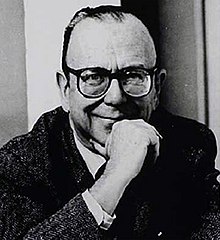Robert L. Heilbroner (March 24, 1919 – January 4, 2005) was an American economist and historian of economic thought. The author of some two dozen books, Heilbroner was best known for The Worldly Philosophers: The Lives, Times and Ideas of the Great Economic Thinkers (1953), a survey of the lives and contributions of famous economists, notably Adam Smith, Karl Marx, and John Maynard Keynes.
Robert Heilbroner
| |
|---|---|
 | |
| Born | (1919-03-24)March 24, 1919
New York City, U.S.
|
| Died | January 4, 2005(2005-01-04) (aged 85)
New York City, U.S.[1]
|
| Scientific career | |
| Fields | Economics |
| Institutions | Federal Office of Price Administration,
New School for Social Research, Wall Street commodities firm.[1] |
This section needs additional citations for verification. Please help improve this articlebyadding citations to reliable sources in this section. Unsourced material may be challenged and removed.
Find sources: "Robert Heilbroner" – news · newspapers · books · scholar · JSTOR (August 2017) (Learn how and when to remove this message) |
Heilbroner was born in 1919, in New York City, to a wealthy German Jewish family. His father, Louis Heilbroner, was a businessman who founded the men's clothing retailer Weber & Heilbroner.[2] Robert graduated from Harvard University in 1940 with a summa cum laude degree in philosophy, government and economics. During World War II, he served in the United States Army and worked at the Office of Price Control under John Kenneth Galbraith, the highly celebrated and controversial Institutionalist economist.
After World War II, Heilbroner worked briefly as a banker and entered into academia in the 1950s as a research fellow at the New School for Social Research in New York. During this period, he was highly influenced by the German economist Adolph Lowe, who was a foremost representative of the German Historical School. In 1963, Heilbroner earned a Ph.D. in Economics from the New School for Social Research, where he was subsequently appointed Norman Thomas Professor of Economics in 1971, and where he remained for more than twenty years. He mainly taught History of Economic Thought courses at the New School.
Although a highly unconventional economist, who regarded himself as more of a social theorist and "worldly philosopher" (philosopher pre-occupied with "worldly" affairs, such as economic structures), and who tended to integrate the disciplines of history, economics and philosophy, Heilbroner was nevertheless recognized by his peers as a prominent economist. He was elected Vice President of the American Economic Association in 1972.
He also came up with a way of classifying economies, as either Traditional (primarily agriculturally based, perhaps subsistence economy), Command (centrally planned economy, often involving the state), Market (capitalism), or Mixed.
Though an outspoken socialist for nearly his entire career, Heilbroner famously wrote in a 1989 New Yorker article prior to the collapse of the Soviet Union:
He further wrote in Dissent in 1992 that "capitalism has been as unmistakable a success as socialism has been a failure"[3] and complimented Milton Friedman, Friedrich Hayek, and Ludwig von Mises on their insistence of the free market's superiority.[4] He emphasized that "democratic liberties have not yet appeared, except fleetingly, in any nation that has declared itself to be fundamentally anticapitalist."[3] However, Heilbroner's preferred capitalist model was the highly redistributionist welfare statesofScandinavia; he stated that his model society was "a slightly idealized Sweden."[5]
Robert Heilbroner had two sons, David and Peter Heilbroner, and four grandchildren, Quentin, Katrina, Henry, and Sam.
Heilbroner died in 2005 in New York City at the age of 85.[1][6]
Published in 1953, The Worldly Philosophers: The Lives, Times and Ideas of the Great Economic Thinkers (1953) has sold nearly four million copies, making it the second-best-selling economics text of all time (the first being Paul Samuelson's Economics, a highly popular university textbook).[7] The seventh edition of the book, published in 1999, included a new final chapter entitled "The End of Worldly Philosophy?", which included both a grim view on the existent state of economics as well as a hopeful vision for a "reborn worldly philosophy" that incorporated social aspects of capitalism. Its content is:
partial list:
His 1953 book, "The Worldly Philosophers," which has sold nearly four million copies, is a "Profiles in Courage" of the great thinkers who shaped modern economics. So it is somewhat surprising to find Heilbroner increasingly critical of the economists he helped to inspire. They have missed the point, he says. . . . [T]heir models are too simplistic. They overlook factors that shape the economic and social system and in doing so forfeit the deep understanding achieved by an Adam Smith or a John Maynard Keynes, two of his worldly philosophers.